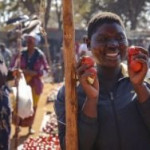October 30, 2019 - 03:30 pm to 04:30 pm EST 1201 Eye Street NW 12th Floor Conference Center Washington, DC 20005 United States Co-Organized by the CGIAR Research Program on Policies, Institutions, and Markets (PIM) and IFPRI. How can agriculture and na... Source: Malawi Strategy Support Program
GCAN at AIARD’s 55th Annual Conference
On June 2, 2019, GCAN team member Elizabeth Bryan participated in the Association for International Agriculture and Rural Development’s (AIARD) 55th Annual Conference in a session on What will it Take to Build Resilient Food Systems Globally?. Her ligh... Source: Gender, Climate Change, and Nutrition Integration Initiative (GCAN)
Presentation of GCAN results in Bangladesh
On May 7, 2019, the GCAN team presented the results of GCAN research activities in Bangladesh at Dhaka’s Lakeshore Hotel at a seminar on “Working at the intersection of climate change, gender and nutrition: A useful proposition?” Presentations include: Linking Gender, Climate Change, and Nutrition for Strengthened Policy and Programming, by Elizabeth Bryan, Empowered Bangladeshi […] Source: Gender, Climate Change, and Nutrition Integration Initiative (GCAN)
Gender and agricultural mechanization: A mixed-methods exploration of the impacts of multi-crop reaper-harvester service provision in Bangladesh
Farmer hiring of agricultural machinery services is common in South Asia. Informal fee-for-service arrangements have positioned farmers so they can access use of machinery to conduct critical, timesensitive agricultural tasks like land preparation, seeding, irrigation, harvesting and post- harvesting operations. However, both the provision and rental of machinery services are currently dominated by men, and […] Source: Gender, Climate Change, and Nutrition Integration Initiative (GCAN)
Evidence from Malawi: Why agricultural and nutrition education programs should engage both women and men in households
This blog is crossposted from the IFPRI website and was written by Catherine Ragasa and Noora-Lisa Aberman. Gender norms and inequalities are an important factor in Malawi’s ongoing food security problems. They shape agricultural practices and production, knowledge acquisition, innovation, food choices—and ultimately household food security and nutrition. Women have generally lower levels of education and lack >> Read more Source: Malawi Strategy Support Program
- « Previous Page
- 1
- …
- 23
- 24
- 25
- 26
- 27
- …
- 31
- Next Page »

